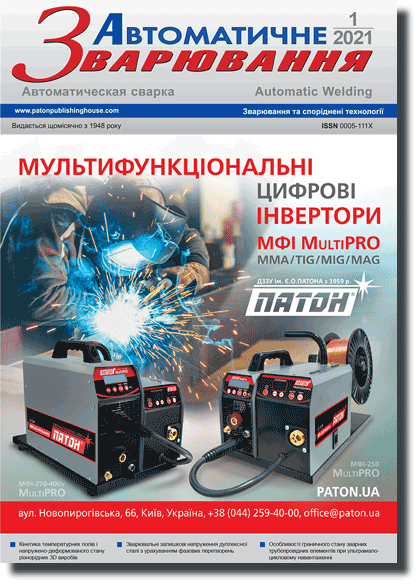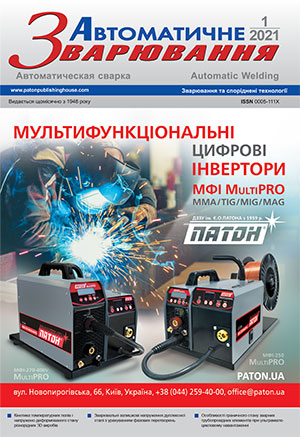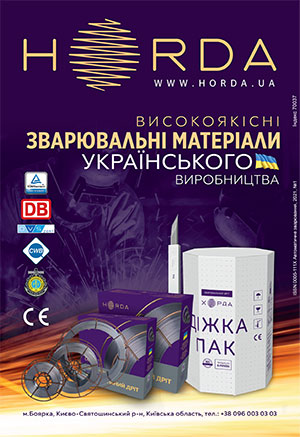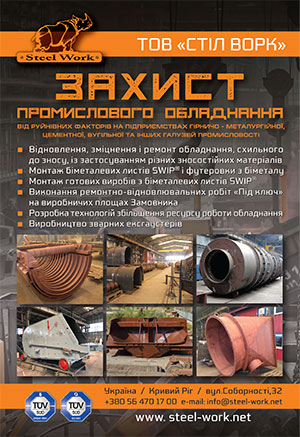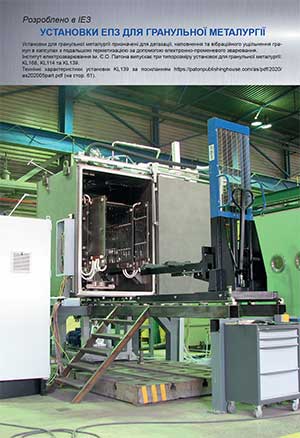| 2021 №01 (04) |
DOI of Article 10.37434/as2021.01.05 |
2021 №01 (06) |
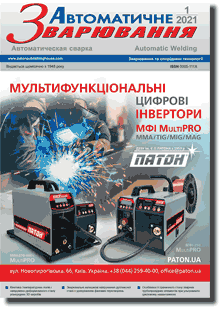
"Avtomatychne Zvaryuvannya" (Automatic Welding), #1, 2021, pp. 25-31
Influence of external electromagnetic field on parameters and defects of crystal lattice of metal of welded joints during underwater welding
S.Yu. Maksimov, О.М. Berdnikova, O.O. Prilipko, T.O. Alekseenko, E.V. Polovetsky
E.O. Paton Electric Welding Institute of the NAS of Ukraine. 11 Kazymyr Malevych Str., 03150, Kyiv, Ukraine. E-mail: office@paton.kiev.ua
A study of the influence of the external electromagnetic field on the parameters and defects of the crystal lattice (dislocation) in the metal of welded joints of low-alloy steel produced under water was carried out. A mathematical model and software package for calculating density of welding and eddy currents in massive conductors, the density of magnetizing currents on the surface of ferromagnetic bodies were developed, mathematical models were used to analyze distribution of electrodynamic forces in arc welding and external electromagnetic influences and reliability of the obtained results. It was established that the external electromagnetic influence improves the quality of the weld metal, which is very important in welding critical structures operating in the water environment. It is shown that during underwater welding of joints and applying external electromagnetic influence in the metal of heat-affected-zone, a finer-grained substructure is formed with a general decrease in the density of dislocations and its uniform distribution. The estimates of the level of local internal stresses taking into account the peculiarities of distribution and density of dislocations in structural components show that their maximum level is formed during welding without external electromagnetic influence along the boundaries of upper bainite rails in the places of long dislocation clusters – concentrators of local internal stresses. The low level of local internal stresses is observed in the metal of the welded joints produced on the conditions at application of external electromagnetic influence. This is facilitated by the general decrease in the density of dislocations and their uniform distribution in the structural components of the lower bainite, which should provide the crack resistance of welded joints. 19 Ref., 1 Tabl., 5 Fig.
Keywords: underwater welding, welded joints, external electromagnetic influence, microstructure, dislocation density, dislocation hardening, local internal stresses
Received: 16.12.2020
References
1. Ryzhov, R.N., Kozhukhar, V.I., Maksimov, S.Yu., Prilipko, E.A., (2004) Application of external electromagnetic actions for improvement of mechanical properties of welds in underwater wet welding. The Paton Welding J., 11, 49-51.2. Grinberg, G.A. (1948) Selected problems of mathematical theory of electric and magnetic phenomena. Moscow, Izd. AN SSSR [in Russian].
3. Tozoni, O.V. (1964) Mathematical models for calculation of electric and magnetic fields. Kiev, Naukova Dumka [ in Russian].
4. Tozoni, O.V., Fedchun, L.V. (1964) Calculation of magnetic field of nonsaturated machines by method of integral equations. Izv. Vuzov. Elektromekhanika, 5, 471-478 [in Russian].
5. Gulyaev, A.P. (1986) Metals science. Moscow, Metallurgiya [in Russian].
6. Savich, I.M., Kareta, N.L., Grishanov, A.A., Sladkova, V.N. (1982) Influence of cooling rate on distortion of crystal lattice in welding under water and in air. Avtomatich. Svarka, 5, 8-9 [in Russian].
7. Larikov, L.N., Falchenko, V.M., Gertsriken, D.S., Khrenov, K.K. (1978) On mechanism of influence of pulsed magnetic field on atomic mobility in iron and aluminium. Dokl. AN SSSR, 239(2), 312-314 [in Russian].
8. Larikov, L.N. (1980) Healing of defects in metals. Kiev, Naukova Dumka [in Russian].
9. Gertsriken, D.S., Dekhtyar, I.Ya. (1960) Diffusion in metals and alloys in solid phase. Moscow, Fizmatgiz [in Russian].
10. Larikov, L.N., Falchenko, V.M., Mazanko, V.F. et al. (1975) Anomalous acceleration of diffusion in pulsed loading of metals. Dokl. AN SSSR, 221(5), 1073-1075 [in Russian].
11. Olemskoj, A.I., Panin, V.E., Petrunin, V.A. (1986) Mixed states and physical mechanics of defects in strongly excited crystals. Izv. Vuzov. Fizika, 2, 20-27 [in Russian]. https://doi.org/10.1007/BF00896342
12. Goldshtejn, M.I., Litvinov, V.S., Bronfin, B.M. (1986) Physics of metals. Moscow, Metallurgiya [in Russian].
13. Kozlov, E.V., Koneva, N.A., Popova, N.A. (2009) Grain structure and geometrically required dislocations and particles of secondary phases in polycrystals of micro- and mesolevels. Fizicheskaya Mezomekhanika, 12(4), 93-106 [in Russian]. https://doi.org/10.1016/j.physme.2009.12.010
14. Farber, V.M., Belenky, B.Z., Goldshtejn, M.I. (1975) Evaluation of strength of low-carbon low-alloyed steels on structural data. Fizika Metallov i Metallovedenie, 3(2), 403-409 [in Russian].
15. Farber, V.M., Selivanova, O.V. (2001) Classification of stress relaxation processes and their manifestation in plastic deformation of metals. Metally, 1, 110-115 [in Russian].
16. Berdnikova, O., Pozniakov, V., Bernatskyi, A. et al. (2019) Effect of the structure on the mechanical properties and cracking resistance of welded joints of low-alloyed highstrength steels. Procedia Structural Integrity, 16, 89-96. https://doi.org/10.1016/j.prostr.2019.07.026
17. Markashova, L.I., Poznyakov, V.D., Berdnikova, E.N. et al. (2017) Structure and service properties of welded joints of high-strength steels, aluminium and titanium alloys, The Paton Welding J., 7, 6-14. https://doi.org/10.15407/tpwj2017.07.02
18. Markashova, L.I., Poznyakov, V.D., Shelyagin, V.D. et al. (2018) Effect of metal structure on service properties of highstrength steel welded joints produced using different methods of welding, The Paton Welding J., 2, 7-13. https://doi.org/10.15407/tpwj2018.02.02
19. Markashova, L.I., Poznyakov, V.D., Gaivoronskii, A.A. et al. (2011) Estimation of the strength and crack resistance of the metal of railway wheels after long-term operation. Fiz.-Khim. Mekh. Mater., 47, 6, 73-79 [in Russian]. https://doi.org/10.1007/s11003-012-9458-1
Advertising in this issue:
The cost of subscription/purchase order journals or individual articles
| Journal/Currency | Annual Set | 1 issue printed |
1 issue |
one article |
| TPWJ/USD | 384 $ | 32 $ | 26 $ | 13 $ |
| TPWJ/EUR | 348 € | 29 € | 24 € | 12 € |
| TPWJ/UAH | 7200 UAH | 600 UAH | 600 UAH | 280 UAH |
| AS/UAH | 1800 UAH | 300 UAH | 300 UAH | 150 UAH |
| AS/USD | 192 $ | 32 $ | 26 $ | 13 $ |
| AS/EUR | 180 € | 30 € | 25 € | 12 € |
| SEM/UAH | 1200 UAH | 300 UAH | 300 UAH | 150 UAH |
| SEM/USD | 128 $ | 32 $ | 26 $ | 13 $ |
| SEM/EUR | 120 € | 30 € | 25 € | 12 € |
| TDNK/UAH | 1200 UAH | 300 UAH | 300 UAH | 150 UAH |
| TDNK/USD | 128 $ | 32 $ | 26 $ | 13 $ |
| TDNK/EUR | 120 € | 30 € | 25 € | 15 € |
AS = «Automatic Welding» - 6 issues per year;
TPWJ = «PATON WELDING JOURNAL» - 12 issues per year;
SEM = «Electrometallurgy Today» - 4 issues per year;
TDNK = «Technical Diagnostics and Non-Destructive Testing» - 4 issues per year.





